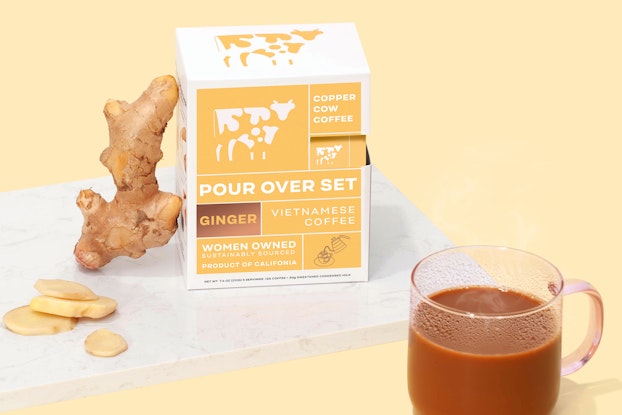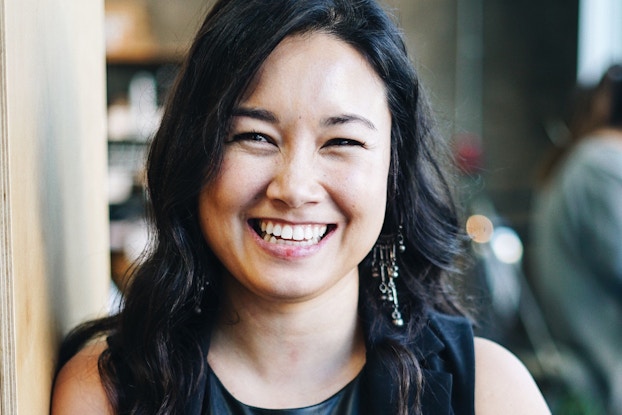
Though Starbucks may be the pioneering arbiter of specialty coffee for the masses, it’s far from alone in the category now. With a market valued at $88 billion, according to the Specialty Coffee Association (SCA), the U.S. is now the world’s largest market for coffee, with interest in specialty coffee increasing at a particularly fast clip.
This recent growth has supported the rise of smaller brands that service new niches. One such brand is Copper Cow Coffee, a startup bringing the Vietnamese coffee experience to the average coffee drinker.
Founder and CEO Debbie Wei Mullin, whose mother came to the U.S. from Vietnam as a refugee, was inspired to create a product that combined the Vietnamese culture she experienced at home with a transparent and ethical supply chain that could support business growth in the developing nation.
After just three years on the market, Copper Cow’s single serve pourer kits are stocked in around 3,000 doors across the U.S., in a spectrum of retailers from Bloomingdale’s to Walmart. With a rush of online interest as a result of COVID-19 lockdowns, ecommerce now makes up about half of the business.
Mullin’s strategy for long-term success, however, is building the perfect symphony of brand identity, product and user experience. “When you sell a product, if you don't have a good package, no one’s going to buy it,” she said. “If it’s not a good product, no one's going to rebuy it. And if you don’t have a good story, no one’s ever going to be loyal to you.”
When you sell a product, if you don't have a good package, no one’s going to buy it. If it’s not a good product, no one's going to rebuy it. And if you don’t have a good story, no one’s ever going to be loyal to you.Debbie Wei Mullin, founder and CEO, Copper Cow Coffee
Bridging Vietnamese and American coffee cultures
“Vietnam is the second largest coffee producer in the world and they have a pretty advanced coffee culture themselves,” Mullin said, explaining her decision-making behind finding the perfect partner for growing and roasting in Vietnam. “We pay twice market rates in Vietnam to make sure that we really incentivize the farmers to [meet] the standards that we need.”
To update traditional Vietnamese coffee, Copper Cow infuses coffee with natural ingredients inspired by Mullin’s West Coast upbringing. “We’re equal parts Vietnam and California,” she said, “so while we have a really authentic Vietnamese heritage in the base product, we like to add really inventive flavors, like lavender or ginger.”
Experimental flavors also help Copper Cow differentiate from the competition. “One of the most important features of a specialty coffee experience has to do with flavor communication,” Peter Giuliano, chief research officer with the SCA, told CO—. “Specialty coffee is all about flavor diversity, and consumers have strong preferences about their coffees.”
Adapt
Copper Cow Coffee is seeing a spike in sales as a large percentage of the workforce switches to working remotely. Read on for ways you can retrain your workforce in the face of this new work environment.
Tapping into today’s specialty coffee trends: single-serve and higher-end brews
Demand for convenient, single-serve coffee has been on a steady rise, according to research by Mordor Intelligence, powering the popularity of instant coffee, K-cups and the like. Options such as K-cups, however, stand to suffer lost market share as consumers, seeking sustainability from the products they buy, grow increasingly concerned with waste from these single-use plastics. Mullin takes care to point out that her company is conscious of and invested in developing product and packaging that produce as little waste as possible.
The second major trend is a shift towards purchasing and preparing higher-quality coffee for the home, particularly pronounced now, as more people have converted to working from home, rather than in an office.
Mullin and other competitors in the specialty coffee space face an interesting situation. Until this year, a large amount of coffee purchased in the U.S. was for offices and other professional spaces. With a global pandemic forcing a huge swath of office workers to perform their jobs remotely, there’s little need for coffee breaks, either in office kitchens or nearby cafes.
Luckily for Mullin and Copper Cow, working from home often means brewing coffee at home as well. More people have time to dedicate to the ritual of coffee making in the mornings or throughout the workday, and with fewer options for shopping in-store, they’re going online to explore and purchase new specialty coffee providers. According to research from digital payment platform Square and the SCA, sales of coffee subscriptions are up 109% since shelter-in-place orders took effect in March.

The female-founder experience
As the company has grown, Copper Cow has had to navigate a fundraising landscape that isn’t always easy for women. The company has so far raised $3 million, according to Mullin, which it has largely dedicated to growing its online business.
“I think it’s really hard for [a] woman to raise venture capital pre-revenue and pre-product,” Mullin said, explaining that because venture funds are largely male-dominated, they tend to invest in the businesses that make the most sense to them.
“Most coffee companies are pretty masculine-branded,” she said, “but we’ve taken on a really different kind of clientele.” According to Mullin, 80% of Copper Cow's customers so far are between 25 and 35 and they’re female. “Our branding speaks to that, because we want to meet them where they are.”
Rather than let it hinder her company’s growth, Mullin sees the journey as an ultimately positive one. “I had to spend two years bootstrapping my company into existence where I fought tooth and nail for every account and every sale,” she said. “So now that we’re going into this new normal of economic uncertainty, I feel like I’m pretty conditioned to be able to operate in a lower resource environment. We’re growing very fast today, but we don’t know what the world is going to look like when everybody goes back to work.”
CO— aims to bring you inspiration from leading respected experts. However, before making any business decision, you should consult a professional who can advise you based on your individual situation.
Want to read more? Be sure to follow us on LinkedIn!
CO—is committed to helping you start, run and grow your small business. Learn more about the benefits of small business membership in the U.S. Chamber of Commerce, here.







